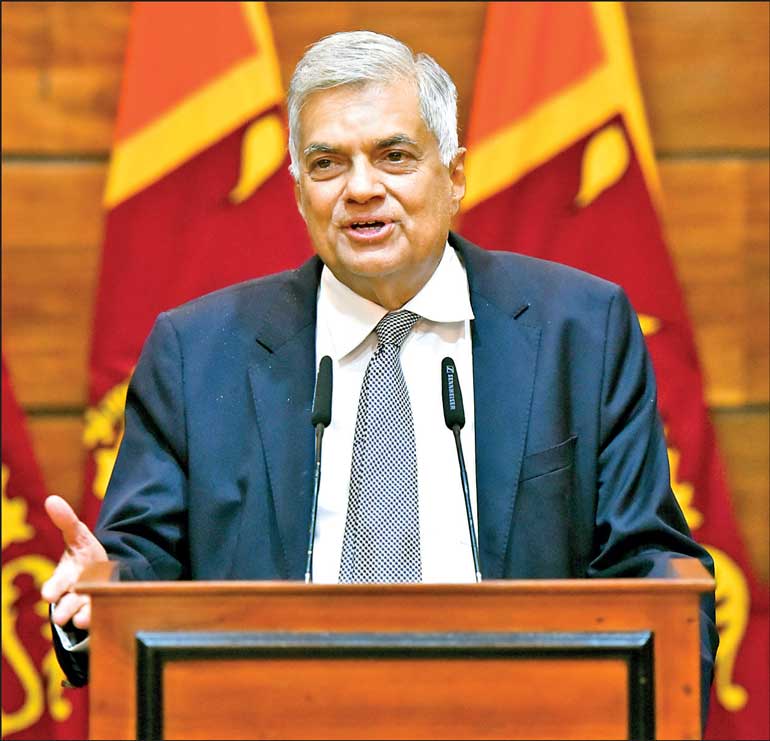Monday Feb 16, 2026
Monday Feb 16, 2026
Friday, 7 October 2022 00:30 - - {{hitsCtrl.values.hits}}

Even though he is striving hard to direct the country to a path that would lead to rescuing it from the acute state of bankruptcy, his endeavour towards it seems to have been weakened by the fact that his recognition has been depleted artificially
 A statement I made on Ranil Wickremesinghe that he was the most suitable person for Sri Lanka to have been chosen from among the current politicians to solve the balance of payments crisis facing the country has caused strong opposition from some critics; and I must say that I was amused by the tone of the vituperative and angry criticisms that some of them have made about it. Responding to a number of harsh comments posted on social media, I appealed to them to suggest a better person, if there’s any, who could have been chosen instead of Ranil, but no one has responded to my specific request.
A statement I made on Ranil Wickremesinghe that he was the most suitable person for Sri Lanka to have been chosen from among the current politicians to solve the balance of payments crisis facing the country has caused strong opposition from some critics; and I must say that I was amused by the tone of the vituperative and angry criticisms that some of them have made about it. Responding to a number of harsh comments posted on social media, I appealed to them to suggest a better person, if there’s any, who could have been chosen instead of Ranil, but no one has responded to my specific request.
The conundrum of Gotabaya and Ranil
Another observation I have brought to the fore in that dialogue was that Gotabaya was a character bloated in exaggeration by the media while that of “Ranil” has been destroyed by the media. About one and a half decade ago, a proprietor of one of the most powerful television channels in Sri Lanka, while having a friendly conversation, stated, “I would like to have a president of my choice elected, and I will do everything possible to achieve that goal.” It also appeared that he was keen in working towards having a group of MPs who were loyal to him in Parliament.
He submitted a list of candidates for 22 districts to contest from the “Purawasi Peramuna” of Sirisena Cooray at the parliamentary elections held in October 2000. He must have borne all expenses incurred in that connection. By submitting a list of candidates in respect of each district, and through the effort made by each candidate to secure votes for themselves, he had a strong belief that it would be possible for him to have at least one MP from each district so that he could have a group of 22 MPs in Parliament who were loyal to him. When he indicated his expectation to me I told him that politics is not that simple and he might not secure even a single seat in the 22 districts. My comment was not to his satisfaction, but after the election results were issued he spoke to me on phone and thanked me for making a thorough assessment of the result of the election.
Later, when the Yahapalana regime was on decline, I wanted to know his “game plan” and I talked to a mutual friend about it. The friend called him on the phone and conveyed the message. He immediately gave us a date and a time for a meeting. On the day we met him, he explained his game plan to both of us after reading a long letter he had sent to Ranil and a short two-sentence reply that Ranil had sent him followed by a long reply that he had sent to Ranil thereafter.
In the second letter, he had suggested the changes to be made in the party in such a manner the person he proposed for the next leadership of the UNP would receive powers which should be second only to Ranil. The first letter contained his criticisms on Ranil’s administration of the party. Ranil’s reply was brief, and in two-sentences: ‘Let’s meet and talk about it’. Considering Ranil’s disposition, I was of the opinion that Ranil would not agree to the proposal made in the second letter.
Tarnishing Ranil’s image
Consequent to Ranil not agreeing to his proposal, he adopted a policy of attacking Ranil, mercilessly. The attacks were launched in a brutal and relentless manner. Even though Ranil did not react to them, it led to destroy Ranil’s image to a large extent. However, the owner of this TV channel cannot be considered a wicked person. He was a wealthy and powerful individual with special talents and great potential in some spheres. His contribution to the development of cricket in Sri Lanka was immense. He stood up bravely for his cause and spent his wealth generously for it. His biggest limitation was his arrogance and sense of superiority complex which he had arrogated on himself on account of his wealth, ownership of radio and television channels and the power gained in manipulating public opinion in consequence thereof.
Although he did not succeed in achieving his dream of having a president of his choice before his death, he managed to destroy Ranil’s image and his acceptance by the public to a large extent. And two other channels were able to artificially enhance the recognition of Gotabaya Rajapaksa and make him the President of the country with a huge majority. But, due to not having adequate knowledge or maturity and lack of experience to deal with the presidency he aggravated the existing confusion while creating problems that did not exist.
In the end, he had to flee the country in the face of strong opposition of the public. Consequently, Ranil became the president through a parliamentary election. Even though he is striving hard to direct the country to a path that would lead to rescuing it from the acute state of bankruptcy, his endeavour towards it seems to have been weakened by the fact that his recognition has been depleted artificially while at the same time compelling him to be dependent completely on support of the Pohottuwa Party.
My role
I think I have a special right to talk about the question on how Sri Lanka should solve the present crisis. I can claim to have foreseen in advance that Sri Lanka was heading towards a grave crisis of this nature in spite of the fact that the political leadership, the bureaucratic system and the academia of the country have failed to realise it. For many years, I have been repeatedly stressing that the entire system of Sri Lanka including the socio-political system and the economy will eventually end up in a state of rampant corruption and degeneration thereby plunging the country towards a state of total collapse, failure, bankruptcy and anarchy due to neglect and evasion of necessary reforms.
I have written two books to prove my viewpoint; the number of articles I have written on this subject may be over 100. Nearly 290 group meetings and discussions have been held at village level to socialise this proposition. I have written more than 10 books on the crisis of caste, ethnicity and religion and the manner in which the political and institutional system has become corrupt and distorted. I may have written over a thousand articles on this subject. In the end, the great crash occurred almost exactly as I had projected. In that sense, I can claim to have a special right to explain the methodology that should be adopted to rescue the country from the state it is now trapped in.
Putting the country on right track
It is very rare that a country falls into such an unfortunate situation. Such a situation could arise, may be once in 100 years. Failure to act prudently and rectify the faults may invariably plunge the country into a situation which could have catastrophic consequences that are not easy to overcome. Therefore, it is important that we should all get together regardless of parochial differences and mobilise our full strength to create a socio-political atmosphere conducive to overcoming the crisis. The change of government at this juncture is not a solution to this crisis. The constitution of Sri Lanka has been designed in such a manner that the government in power cannot be changed by any other means except in an election. A revolution is not a solution to this crisis either. The solution to the crisis lies in directing the country to a reform program conducive to effecting a positive and profound change in the entire system.
The reform program needs the approval of the Government and the support of the Opposition. In order to overcome the crisis, it is essential that the ruling party and the Opposition should get together and jointly adopt an appropriate democratic model that will allow everyone to work together as well as will serve as a foundation that could be used for that. Both parties should understand that this crisis cannot be overcome in any manner other than through a collective effort free of factionalism. Similarly, both parties should realise that if they fail to achieve this goal in the manner described above and in consensus, not only the country but also they too, will have to pay a heavy price for that.
The present crisis has to be resolved by reaching a general consensus on a reform program and implementing it. The initial public dialogue for that can be initiated with the Jana Sabah or People’s Councils. Solving the issues pertaining to caste, ethnicity and religion in a manner that would lead to building the Sri Lankan nation should be an important objective of the proposed program. Eradication of corruption, inefficiency and bureaucratism and establishment of a democratic and efficient political system where the rule of law reigns supreme should be made another important objective of it. Introducing economic reforms conducive to resolving balance of payments crisis should be another main objective. Above all, formulation of a new “participatory constitution” that will help make policies and regulations to carry them out effectively, should be another important objective of this program.
If an early election is required, the reform program can be made into a package to be implemented in two phases but connected to each other from the constitutional sense. Identifying the reforms that should be implemented in the proposed program in two phases and reaching a general consensus on it, it would be possible to adopt an interim constitution so that whichever the party comes to power in the election, the program could be advanced as an all-party exercise with a binding statutory obligation to carry out the program. By doing so, the two phase reform program could be turned into a process being implemented under the scrutiny of the judiciary when it has to be implemented in accordance with the constitution.
The credibility of the reform program and the international recognition of it could be enhanced by making the United Nations Organisation an observer of it. At this moment, public organisations also have an important role to play. The public organisations could insist on the Government and the Opposition to direct the country to adopting the reform program that will lead to a profound and positive change in the system. The international community too, should force both parties to embark on it.